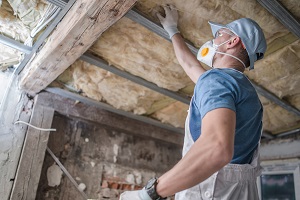
Insurance for Insulation Contractors
In this age of environmental awareness and push towards more energy efficient operations, business has really picked up for insulation contractors. What does this profession really entail? These contractors are tasked with implementing energy efficiency measures and preventative/remediation activities to reduce moisture, resist heat, and control sound. This may include replacing or fixing insulation, drywall, crawl space mold remediation, efficient lighting, and updating heating and power systems. The goal of this type of effort is to maximize comfort and wellness while decreasing energy bills. And, since many organizations—ranging from habitational sites and office buildings to the residential sector—are looking to cut costs, this is becoming a proactive way to save money on fixed expenses while supporting a healthy environment. Because of the environmental nature of insulation and work, it is crucial that contractors involved in these projects have the right type of environmental insurance.
Environmental Concerns for Insulation Contractors
Implementing insulating and/or cleanup methods
- Not securing the site properly during insulation or cleanup procedures, resulting in third parties coming on site and being affected by air emissions or chemicals from treatment technologies or spills from treatment equipment.
- Adding to contamination at a site as a result of the maintenance or storage of heavy equipment, mobile equipment, or vehicles.
- Completed operations exposures due to incomplete or improper line hook-up and system construction.
- Winds or rains creating conditions that lead to site runoff or air emissions affecting offsite properties.
Analyzing samples of air, water, soil, and other materials at locations
- Spills of incorrectly labeled samples so that they are either not analyzed properly or not analyzed at all.
- Sampling residue, filters, or other apparatus being disposed of on-site, creating an area of contamination that had not previously been there.
Determining and designing the best method for site cleanup
- Designing a waste treatment method that fails to work on the chemicals or mixture of materials at a site.
- If the method of treatment is excavation or removal, not excavating/removing enough of the affected material.
- If the method of treatment is foam insulation or mold remediation, creating air emissions without a permit or ones that adversely affect surrounding properties or property owners.
Disposing of materials off-site
- Transporting hazardous waste or mixed hazardous waste to the wrong type of disposal site. Wastes generated on site are often taken to transfer stations, incinerators, or landfills. The waste generator has liability for all hazardous wastes, into perpetuity. Non-owned disposal sites often become large hazardous waste sites, where the entities that utilized the disposal sites can become liable for cleanup costs or third party liability claims.
- Combining incompatible waste during packing into containers where the wastes eventually mix and react.
- If the contractor leaves the site and does not remove the waste materials, the site owner, developer, or project manager may become responsible for proper removal of the waste. If appropriate waste management protocols are not followed, civil fines or penalties can be assessed against these entities which will come back to the contractor.
Insured’s owned premises
- Contamination at owned premises caused by the maintenance or storage of heavy equipment, mobile equipment, or vehicles.
- Storage of foams, cleaning products, paints, chemicals, solvents, etc. at owned premises.
- Storage tanks used for waste oil, hydraulic fluids, or fuel.
Solutions to the Environmental Exposures for Insulation Contractors
- Contractors Pollution Liability: coverage designed to protect from third party claims for damages caused by pollution conditions arising from the contractor’s covered operations.
- Contractors Pollution Liability/Professional: a combined Pollution and Professional coverage form. It provides coverage to contractors who could potentially have both pollution and professional claims. Professional exposures could result from jobsite modifications, construction management services, and other daily operations.
- Premises Pollution Liability: designed to cover claims arising from pollution releases at, on, or emanating from a specific scheduled location. A “location” can be as broad as an entire piece of property or as narrow as a specified storage tank.
- Other insurance lines that can protect insulation contractors. Coverages may include Transportation Pollution Liability, Non-owned Disposal Site Coverage, Business Interruption, etc.
For more information on insulation contractors, or to discuss a specific account, please contact us.
Type: Blog
Topic: Insulation